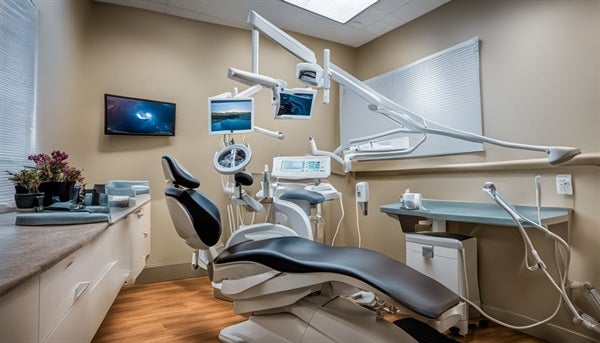Types of Dental Emergencies

Toothaches can be extremely painful and may indicate an underlying dental issue that needs immediate attention.
According to Surrey emergency dentist, broken or chipped teeth can cause discomfort and require prompt care to prevent further damage.
Toothaches
Toothaches signal a dental emergency that shouldn't be ignored. They often result from cavities, worn fillings, receding gums, or cracked teeth, causing sharp pain that demands immediate attention.
These pains can quickly turn into severe oral infections if not treated promptly, highlighting the importance of dental care in maintaining overall oral health.
Managing a toothache at home involves rinsing the mouth with warm water and carefully using dental floss to remove any trapped food particles that might exacerbate the pain. This step can provide temporary relief before you obtain professional treatment.
Remember, consistent dental hygiene practices play a crucial role in preventing tooth decay and gum disease, which are common culprits behind toothaches.
Broken/chipped teeth
Fractured and broken teeth rank among the most frequent dental emergencies. Often, these injuries happen because someone bites down too hard on something or experiences a mouth or face trauma.
Immediate care from a dentist is crucial for any chipped or broken tooth to ensure it gets fixed properly. Without swift professional intervention, the damage could worsen.
Dentists have various methods for repairing tooth fractures, cracks, and chips. They assess the extent of tooth trauma before deciding on the best course of action for repair. Prompt emergency dental care not only restores the appearance but also prevents potential complications like infections that could lead to more severe dental issues.
Knocked-out teeth
Moving from the topic of broken or chipped teeth, another common dental emergency is knocked-out teeth. These incidents often result from a strong blow to the mouth or accidents during contact sports.
In such cases, immediate action can greatly increase the chances of saving the tooth. If you experience a tooth avulsion, handling the knocked-out tooth properly is key. Make sure you pick it up by the crown rather than the root to avoid any further damage.
Acting quickly plays a crucial role here since seeking emergency dental services within an hour significantly improves the possibility of successful re-implantation. Gently rinse off any dirt without scrubbing and try to place it back in its socket if possible; if not, keep it moist by placing it in milk or saliva until you reach your dentist for urgent care.
This swift response could be essential in preventing gaps in your smile and ensuring that professional help can restore your oral health efficiently.
Lost fillings/crowns
Lost fillings and dislodged crowns are urgent dental concerns that require prompt attention from a dentist. If you experience this, carefully clean the affected area and retrieve the lost dental work.
Quick action is essential to prevent further damage and minimize discomfort. Contact your emergency dentist immediately for timely assessment and tooth restoration.
Moving forward, What to Do in a Dental Emergency - Remain calm..
What to Do in a Dental Emergency

If you experience a dental emergency, remain calm and contact an emergency dentist for immediate assistance. For more expert advice on managing dental emergencies, read on.
Remain calm
Stay calm during a dental emergency to keep a clear head and make better decisions. Staying composed can help reduce stress and anxiety, making it easier to communicate with the emergency dentist and follow their instructions.
By staying cool and collected, you can support a smoother experience for yourself or anyone else involved.
Maintain composure during a dental emergency to ensure that you are as focused as possible in managing the situation. By staying unruffled, you can better assess any bleeding or pain while waiting for professional care.
Contact an emergency dentist
If you have a dental crisis after regular business hours, call the dentist's emergency number or an after-hours dentist to get urgent dental care. If you don't have a regular dentist, consider visiting an urgent care facility that offers dental services for toothache emergencies or other dental trauma.
In case of uncertainty about whether your injury is a dental emergency, it is recommended to seek professional advice by calling the emergency dental hotline provided by a dentist.
Control any bleeding or pain
After contacting an emergency dentist, it's essential to manage bleeding and discomfort during a dental emergency. Apply a cold compress to the outside of the mouth or cheek for 5 to 10 minutes to alleviate pain and reduce swelling.
Over-the-counter pain relievers can also help before receiving professional dental care. Applying firm pressure to the injury site for 15 minutes will efficiently control any bleeding.
During a dental emergency, managing bleeding and discomfort is crucial in alleviating pain and facilitating relief until professional care is obtained. Applying a cold compress directly onto the affected area can help with swelling and pain management.
Preserve any knocked-out teeth
After controlling any bleeding or pain, it's crucial to preserve any knocked-out teeth. Act quickly and handle the tooth by its crown, not the root, to avoid damaging delicate tissues.
To keep the tooth moist, try reinserting it into its socket or storing it in milk. Utilize tooth preservation kits if available, but never store the tooth in water. Adults should attempt to gently place a knocked-out permanent tooth back into its socket before seeking emergency dental care.
Upon contacting an emergency dentist immediately after a knocked-out permanent tooth incident, there is a higher chance of saving the tooth. For baby teeth that are knocked out, do not attempt to reinsert them and seek dental care promptly for evaluation by a professional.
How to Prevent Dental Emergencies
Prevent dental emergencies by maintaining good oral hygiene and attending regular dental check-ups. Protect your teeth by wearing a mouthguard during sports and avoiding hard or sticky foods.
Maintain good oral hygiene
Good oral hygiene is essential in preventing dental emergencies. Regular brushing and flossing help remove harmful bacteria that can cause tooth decay and gum disease. By maintaining a daily oral care routine, you can protect your teeth and gums from potential issues that may lead to emergencies.
Additionally, attending regular dental check-ups ensures that any developing problems are identified early on, allowing for timely intervention and prevention of more serious issues down the line.
Wear a mouthguard during sports
Protect your smile by wearing a mouthguard during sports. Mouthguards are highly recommended for athletes in competitive and recreational sports to prevent oral injuries, especially during contact sports.
A properly fitted mouthguard offers the best available protection to reduce the incidence and severity of sports-related dental injuries. Coaches and experts consider mouthguards as effective tools in preventing dental injuries and strongly recommend their use for athletes participating in any physical activity that poses a risk of tooth injury.
Playing contact sports significantly increases the risk of dental injury, making it crucial for athletes to wear a mouthguard at all times to ensure proper protection. Investing in this simple oral protection can help prevent painful dental traumas, ensuring athlete safety and reducing the likelihood of emergency dental visits due to avoidable sporting incidents.
Avoid hard or sticky foods
To prevent dental emergencies, it is important to avoid hard or sticky foods that can damage your teeth. Hard candies and tough shell foods can cause tooth damage and potential emergencies.
Sticky foods like dried fruits or sticky candy can dislodge a crown or filling, leading to dental issues. Loose teeth are vulnerable when biting down on hard foods, which can result in serious dental emergencies if not properly managed.
Consuming starchy foods in moderation is also essential as they can easily get stuck in your mouth, potentially causing dental problems.
Regular dental check-ups
Regular dental check-ups, often scheduled every six months, are essential for maintaining good oral health. These visits allow your dentist to conduct thorough dental examinations and detect any potential issues early on, preventing them from escalating into major problems.
Dental appointments also provide an opportunity for preventive dental care, ensuring that any developing issues are addressed promptly. By attending regular dental check-ups, you contribute to the early detection of dental issues and the maintenance of good oral hygiene.
Visiting the dentist regularly not only helps prevent dental emergencies but also plays a crucial role in maintaining overall good oral health. Through routine oral health checkups, dentists can identify potential problems before they become more serious and require extensive treatment.
Emergency Dental Care Options
Consider same-day appointments for urgent dental needs and explore flexible payment plans to alleviate financial concerns during an emergency. Opt for virtual consultations or inquire about insurance coverage to swiftly access professional help when facing a dental crisis.
Same-day appointments
Same-day appointments for emergency dental care can provide immediate relief for urgent dental issues. With same-day availability, patients can quickly access an emergency dentist and receive the necessary treatment for toothaches, broken teeth, or lost fillings.
Immediate care plays a significant role in alleviating discomfort associated with dental emergencies and addressing urgent dental issues promptly.
Payment plans
Emergency dental care facilities offer payment plans to make urgent dental appointments more accessible to patients. These affordability options allow patients to receive immediate relief and expert care without worrying about the financial burden of a dental emergency.
For those without insurance, reduced rates and direct payment options provide a convenient way to seek treatment without waiting for reimbursements. Additionally, many dentists may offer special promotions or discounts for emergency services, ensuring that patients can promptly address their dental needs regardless of their financial situation.
Virtual consultations
Virtual consultations offer convenient and cost-effective access to dental care through online video calls or phone appointments. With teleconsultation for dental issues, patients can connect with dentists remotely for urgent care support and oral health advice.
This virtual oral health support allows individuals to receive timely guidance and tips on managing dental problems from the comfort of their homes, improving access to dental care 24/7.
Telemedicine and teledentistry have expanded access to oral health support in both rural and urban areas while minimizing costs. Virtual consultations enable dentists to speak directly with patients about potential dental concerns, offering advice and recommendations for manageable issues.
As the demand for on-demand virtual dental care grows, remote access to dental services provides a valuable resource for those seeking rapid assistance with their dental emergencies.
Insurance coverage
When considering emergency dental care options, it’s important to review your insurance coverage. Dental insurance can be instrumental in managing unexpected expenses related to dental emergencies, providing benefits that cover a range of treatments and procedures.
Typically, preventive care such as cleanings and check-ups is fully covered under most plans, while additional procedures like fillings or oral surgery for emergencies may have different coverage levels.
Aflac offers specific benefits designed to help cover costs associated with emergency dental procedures, allowing patients to access necessary care without the burden of high out-of-pocket expenses.
Emergency dental services offered
Emergency dental services are available 24/7, providing urgent care for dental emergencies. You can expect immediate oral health treatment from emergency dental specialists, whether it's for dental pain relief or other urgent care needs.
These services may include same-day appointments, payment plans, virtual consultations, and insurance coverage options to ensure you receive the necessary immediate dental treatment without delay.
In case of a dental emergency requiring immediate treatment and if you don't have a regular dentist, an alternative is going to an urgent care center or your nearest emergency room where they can provide the necessary care promptly.